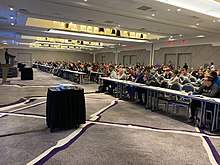Securly
 | |
Type of site | Web filtering for schools |
|---|---|
| Owner | Golden Gate Capital |
| Founder(s) | Vinay Mahadik, Bharath Madhusudan, Nikita Chikate |
| Key people |
|
| URL | www |
| Launched | January 2013 |
Securly, Inc. is an educational software company based in San Jose, California and incorporated in Delaware. It develops and sells internet filters and other technologies which primary and secondary schools use to monitor students' web browsing, web searches, video watching, social media posts, emails, online documents, and drives.[1] It was founded in 2013.[2]

Reception
[edit]
Securly has been criticized for providing tools that empower schools to censor content and invade students' privacy. As a result, exploits have been made to bypass Securly's filter, however most have been patched. In 2017, the Milwaukee Journal Sentinel reported on Arrowhead High School's implementation of Securly, which received pushback from parents and students. The software monitored activity of school-owned equipment, but also of students' own devices that connected to the school's Wi-Fi. Points of contention included the risk of Securly being hacked, the potential sale of browsing and search history to insurance companies and advertisers, and general privacy concerns. Securly stated that they "monitor students' internet searches and social media posts; flag them for references that suggest such things as drug use, cyberbullying or suicide; and share students' internet browsing histories with parents who want them."[3] Common Sense Media director Girard Kelly said events like the Cambridge Analytica scandal and the Equifax data breach show the need to protect students' data, arguing Securly does the opposite by normalizing a "surveillance state" where students have to give up their data without their consent.[4] In 2023, the parents of 2 California students filed a class action lawsuit against Securly, alleging that Securly collected students' private information without their consent and selling that information to third party vendors.[5]
Securly says that its service allows schools to almost achieve compliance with state and federal requirements such as the Children's Internet Protection Act (CIPA).[6] Securly has claimed its services help prevent school shootings by blocking violent content , but it has been criticized for not providing data that supports this claim. It has also been criticized for the content that it deems violent, for example the 1955-1975 CBS television western Gunsmoke is a piece of media that Securly has deemed violent.[7][8]
Awards
[edit]Securly in 2020 won the EdTech breakthrough award for use of Artificial Intelligence for Student Safety.
References
[edit]- ^ Kolodny, Lora. "Securly raises $4 million to put guard rails on the internet for K-12 students". TechCrunch. Retrieved October 9, 2017.
- ^ "About Us - Securly". www.securly.com. Retrieved June 16, 2021.
- ^ Johnson, Annysa. "Students, the website you've visited at high school will now be seen by your parents". Milwaukee Journal Sentinel. Retrieved June 16, 2021.
- ^ Stolzoff, Simone. "Schools are using AI to track what students write on their computers". Quartz. Retrieved June 16, 2021.
- ^ "Class action lawsuit claims school security software company violated students' privacy". K-12 Dive. Retrieved February 28, 2024.
- ^ Brewster, Thomas. "This AI Startup Constantly Monitors Kids To Stop The Next School Shooting—And It Just Scored $16 Million Funding". Forbes. Retrieved July 1, 2021.
- ^ "Schools Spy on Kids to Prevent Shootings, But There's No Evidence It Works". Vice. Retrieved February 24, 2019.
- ^ Beckett, Lois (October 22, 2019). "Under digital surveillance: how American schools spy on millions of kids". The Guardian. ISSN 0261-3077. Retrieved December 10, 2020.
